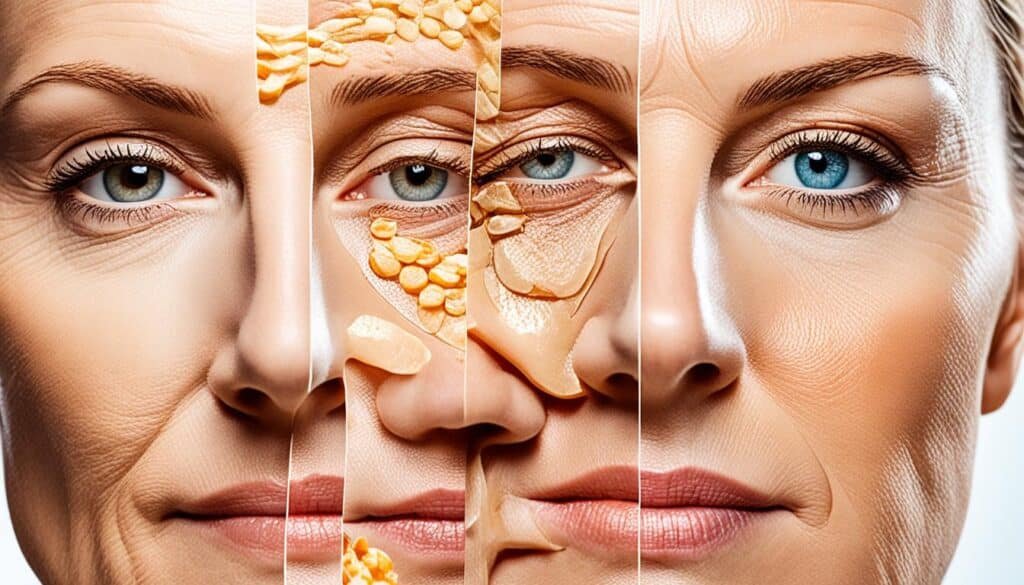Benefits Of Using Sunscreen is one of the best and easiest ways to protect your skin’s appearance and health at any age. Used regularly, sunscreen helps prevent sunburn, skin cancer and premature aging. Sunscreen plays an important role in blocking ultraviolet (UV) radiation from being absorbed by the skin. UV radiation damages the skin and can lead to sunburns and skin cancer. No sunscreen blocks UV radiation 100%, but they allow you to be outdoors for a longer time before your skin starts to redden.
Key Takeaways
- Sunscreen helps protect your skin from harmful UV radiation, preventing sunburn and skin cancer.
- Regular use of sunscreen can also reduce the signs of premature skin aging, such as wrinkles and sun spots.
- Choosing a broad-spectrum sunscreen with an SPF of 30 or higher is recommended for optimal sun protection.
- Applying sunscreen correctly and reapplying every two hours is crucial for maintaining its effectiveness.
- Incorporating sunscreen into your daily skin care routine is an important step in maintaining healthy, youthful-looking skin.
Understanding Sunscreen and Its Importance
Sunscreen is a crucial component of any comprehensive skin care routine, as it plays a vital role in protecting your skin from the harmful effects of UV rays. By understanding the science behind sunscreen and its various applications, you can make informed decisions to safeguard your skin and prevent sunburn, skin cancer, and premature skin aging.
What is Sunscreen?
Sunscreens are formulated to block ultraviolet (UV) radiation from being absorbed by the skin. UV radiation, which includes both UVA and UVB rays, can cause significant damage to the skin, leading to various skin conditions and health concerns. Sunscreens work by either absorbing or reflecting these harmful rays, preventing them from penetrating the skin and causing harm.
The Role of SPF (Sun Protection Factor)
The Sun Protection Factor (SPF) on a sunscreen label is a measure of how well the product protects against UVB rays, which are primarily responsible for causing sunburns. As the SPF value increases, the sunscreen’s ability to block UVB rays and prevent sunburns also increases. While higher SPF numbers offer greater protection from UV rays, it’s important to note that no sunscreen can block 100% of UV radiation.
Types of Sunscreen: Chemical and Mineral
Sunscreens are generally categorized into two main types: chemical sunscreens and mineral sunscreens. Chemical sunscreens work by absorbing UV radiation and converting it into a negligible amount of heat, while mineral sunscreens reflect and scatter UV rays away from the skin. Both types of sunscreens can provide effective broad-spectrum protection when used correctly and consistently.
Regardless of the type of sunscreen you choose, it’s essential to select a product that offers broad-spectrum protection against both UVA and UVB rays, and to apply it generously and reapply it regularly to ensure maximum skin protection.
Preventing Sunburn and Skin Cancer

Sunscreen plays a crucial role in protecting your skin from the harmful effects of ultraviolet (UV) radiation, which can lead to sunburn and skin cancer. By understanding how sunscreen safeguards against UVB rays and reduces the risk of skin cancer development, you can make informed choices to prioritize your skin’s health.
How Sunscreen Protects Against UVB Rays
Sunscreen acts as a shield, blocking UVB rays that are primarily responsible for causing sunburns. UVB intensity fluctuates throughout the year, and even on overcast days, these rays can still penetrate your skin and leave you vulnerable to burning. Over time, excessive UVB exposure damages the DNA within skin cells, which can ultimately lead to various forms of skin cancer. By applying broad-spectrum sunscreen regularly, you can effectively prevent this UV-induced damage and reduce your risk of skin cancer.
Reducing the Risk of Skin Cancer Development
Consistent use of sunscreen is one of the most effective ways to help prevent the development of skin cancer. By shielding your skin from harmful UV protection, sunscreen minimizes the cumulative damage that can eventually trigger cancerous growths. Regular application of a broad-spectrum sunscreen with a high sun protection factor (SPF) is essential in reducing your risk of skin cancer.
Combating Premature Skin Aging

Sun damage and premature skin aging are two of the most concerning consequences of excessive UV exposure. When UV rays penetrate the skin, they can wreak havoc on the essential proteins that keep our skin looking youthful and vibrant.
The Impact of UV Rays on Collagen and Elastin
Collagen and elastin are the structural proteins responsible for maintaining the skin’s firmness, suppleness, and resilience. Unfortunately, UV radiation can significantly damage these critical proteins, leading to visible signs of premature aging such as wrinkles, sagging skin, and a loss of skin elasticity.
Preventing Wrinkles, Sun Spots, and Sagging Skin
Regular use of a high-quality, broad-spectrum sunscreen can help mitigate the harmful effects of UV exposure and prevent the development of sun damage and premature aging. By shielding the skin from harmful rays, sunscreen protects the collagen and elastin, helping to maintain the skin’s youthful appearance and providing anti-aging benefits. This, in turn, reduces the likelihood of developing wrinkles, sun spots, and skin sagging.
Maintaining Even Skin Tone

Uneven skin tone and discoloration can have a significant impact on one’s confidence and overall skin health. Fortunately, regular sunscreen use can play a vital role in maintaining an even, radiant complexion. Exposure to ultraviolet (UV) rays can lead to a host of skin concerns, including blotchy skin, hyperpigmentation, and melasma.
Preventing Blotchy Skin and Hyperpigmentation
UV light exposure can cause the small blood vessels in your face to become enlarged and more prominent, leading to visible red and purple patches and blotchy skin that doesn’t go away. Using sunscreen helps prevent this damage and keeps these enlarged blood vessels from forming. Chronic UV exposure can also cause dark patches on the skin, like in melasma and hyperpigmentation. Everyone, including people with darker skin tones, should wear sunscreen daily to help prevent these skin changes and uneven skin from forming or getting worse.
Reducing the Risk of Melasma
Melasma, a common skin condition characterized by brown or gray-brown patches, is often exacerbated by sun exposure. The UV rays from the sun can trigger the overproduction of skin cells that produce melanin, leading to these discolored areas. Consistent use of broad-spectrum sunscreen can significantly reduce the risk of developing or worsening melasma, helping to maintain an even, radiant skin tone.
Protecting Sensitive Skin Conditions

Individuals with certain skin conditions, such as cutaneous lupus and rosacea, often find that their skin becomes more irritated and sensitive when exposed to the sun’s UV rays. For some, even a brief period of unprotected sun exposure can trigger a flare-up or worsen their existing skin condition.
Preventing Flare-ups of Skin Conditions Like Rosacea
Rosacea, a chronic skin condition characterized by redness, skin irritation, and visible blood vessels, is particularly sensitive to sun exposure. The sun’s UV radiation can exacerbate the skin changes associated with rosacea, leading to increased flushing, inflammation, and the appearance of skin condition symptoms. Consistent use of a broad-spectrum sunscreen is essential for those with rosacea to help protect their skin and minimize the risk of flare-ups.
Minimizing Sun Sensitivity from Medications
Certain medications, such as doxycycline and hydrodrochlorothiazide, can also increase the skin’s sensitivity to the sun, making individuals more prone to sunburns and other skin reactions. In these cases, using a high-SPF sunscreen and practicing sun protection measures become even more crucial to prevent skin damage and skin condition complications.
By incorporating a daily sunscreen routine and being mindful of the skin’s exposure to the sun, individuals with sensitive skin conditions can better protect their skin and mitigate the risk of skin irritation and flare-ups.
Proper Application of Sunscreen

While many people understand the importance of using sunscreen, they often fail to apply it correctly. Proper sunscreen application is crucial for ensuring adequate UV protection and preventing skin damage.
Choosing the Right SPF Level
When selecting a sunscreen, the Sun Protection Factor (SPF) is a key consideration. The American Academy of Dermatology recommends using a sunscreen with an SPF of 15 or higher to help protect against the harmful effects of UV radiation. For optimal protection, choose a broad-spectrum sunscreen that shields against both UVA and UVB rays.
Applying Sunscreen Correctly and Frequently
The proper way to apply sunscreen is to use about 1 ounce (a shot glass full) to cover your entire body, including your face, neck, arms, and legs. For the face and neck alone, you’ll need about a half teaspoon of sunscreen. Apply the sunscreen to dry skin about 15 to 30 minutes before going outdoors to allow it to be absorbed. Reapply at least every two hours, or more often after swimming or sweating, to maintain consistent protection.
By following these guidelines for applying sunscreen correctly and choosing the right SPF, you can help ensure your skin is adequately protected from the sun’s harmful UV rays.
Benefits Of Using Sunscreen

Sunscreens are often grouped into two categories: chemical and mineral. Both types work by absorbing UV light and transforming that energy into negligible amounts of heat. Mineral sunscreens also reflect a small amount of UV light. A sunscreen that is broad spectrum will protect against both UVB and UVA rays, providing broad-spectrum protection against the full range of UV protection.
Broad-Spectrum Protection Against UVA and UVB Rays
Broad-spectrum sunscreens are essential for comprehensive skin protection, as they sunscreen blocks both UVB rays, which cause sunburns, and UVA rays, which contribute to long-term skin damage and premature aging. By using a broad-spectrum sunscreen, you can sunscreen helps shield your skin from the harmful effects of both UVB and UVA radiation, reducing the risk of sunburns, skin cancer, and accelerated skin aging.
Water Resistance for Outdoor Activities
Sunscreens that are water-resistant provide protection while swimming or sweating for a certain amount of time, making them ideal for outdoor activities. This feature helps ensure that the sunscreen benefits remain effective even during physical activities that involve exposure to water or perspiration, allowing you to enjoy the outdoors with the confidence of knowing your skin is well-protected.
Addressing Concerns About Sunscreen Safety

As the use of sunscreen becomes more widespread, some people have raised questions about the safety of the ingredients in these products. Recent studies have examined the potential absorption and potential effects of common sunscreen ingredients, shedding light on this important issue.
Recent Studies on Sunscreen Ingredient Absorption
A 2019 study published in the Journal of the American Medical Association (JAMA) found that six common sunscreen ingredients – avobenzone, oxybenzone, octocrylene, and three others – were absorbed into the bloodstream after a single application. The study also revealed that these ingredients in the sunscreen remained in the body for an extended period, even after participants stopped using the products.
However, the U.S. Food and Drug Administration (FDA) has not labeled these ingredients as unsafe, and still recommends the regular use of sunscreen to protect against the harmful effects of UV exposure, including skin cancer.
Environmental Impact and Alternative Sun Protection Methods
In addition to concerns about sunscreen safety, there are also discussions around the potential environmental impact of certain sunscreen ingredients. Studies have suggested that the chemicals oxybenzone and octinoxate may have negative effects on coral reefs and other aquatic life, leading to bans on the sale of sunscreen ingredient absorption products containing these ingredients in some areas.
For those concerned about the environmental impact or alternative sun protection methods, there are other options to consider, such as seeking out mineral-based sunscreens, wearing protective clothing, and seeking shade during peak UV hours.
Incorporating Sunscreen into Your Daily Routine
Even if you primarily stay indoors, you’re constantly exposed to UV radiation, so using sunscreen regularly is crucial. According to the Skin Cancer Foundation, sunscreen should be reapplied every two hours, especially after swimming or sweating. If you work indoors and sit away from windows, you may not need a second application. But be mindful of how often you step outside, even for a short stroll at lunch, as your skin can still be at risk.
The Importance of Daily Sunscreen Use
Wearing sunscreen every day is essential for maintaining healthy, youthful skin. Daily sunscreen use helps prevent sun damage, premature aging, and skin cancer. By incorporating sunscreen into your daily skin care routine, you can enjoy the benefits of sunscreen daily and protect your skin from the harmful effects of UV exposure.
Tips for Making Sunscreen a Habit
To ensure you use sunscreen regularly, try these tips:
- Keep sunscreen visible and accessible, such as on your bathroom counter or in your bag.
- Set a reminder on your phone or calendar to apply sunscreen every two hours when spending time outdoors.
- Incorporate sunscreen application into your morning routine, just like brushing your teeth or applying moisturizer.
- Choose a daily sunscreen that you enjoy using, whether it’s a tinted formula or one with a pleasant scent.
By making sunscreen a part of your daily sunscreen routine, you’ll be well on your way to protecting your skin from the sun’s harmful rays.
Also Read: The Ultimate Sensitive Skin Care Routine: Step By Step Guide
Conclusion
The benefits of using sunscreen extend far beyond mere sunburn prevention. Sunscreen is a critical component in safeguarding your skin’s health. By blocking harmful UV rays, sunscreen helps to prevent premature aging, such as wrinkles and fine lines, ensuring that your skin maintains its youthful appearance for longer. Regular use of sunscreen significantly reduces the risk of developing skin cancer, including melanoma, which can be life-threatening.
Furthermore, sunscreen aids in preventing sun-induced hyperpigmentation and dark spots, leading to a more even skin tone. For those with sensitive skin or conditions like rosacea, sunscreen provides a protective barrier, reducing flare-ups and irritation. It also helps maintain skin’s moisture levels by preventing excessive drying caused by sun exposure.
Choosing the right sunscreen, with broad-spectrum protection and an appropriate SPF, ensures comprehensive coverage against both UVA and UVB rays. Incorporating sunscreen into your daily skincare routine is a simple yet powerful step towards long-term skin health. Remember, consistent application is key – even on cloudy days or during winter months. Ultimately, the daily use of sunscreen is a proactive measure that offers enduring benefits, protecting your skin’s health and enhancing its natural beauty.
FAQs
Q: Why is it important to wear sunscreen every day?
A: Wearing sunscreen every day helps protect your skin from harmful UV rays that can lead to skin damage and various skin conditions, including skin cancer.
Q: What are the benefits of wearing sunscreen?
A: The benefits of wearing sunscreen include protecting your skin from UV damage, preventing premature aging, reducing the risk of skin cancer, and maintaining overall skin health.
Q: Is SPF 30 sunscreen effective?
A: Yes, SPF 30 sunscreen is effective in providing protection against both UVA and UVB rays, helping to prevent sunburn and skin damage.
Q: How does sunscreen with a high SPF protect the skin?
A: Sunscreen with a high SPF provides increased protection by blocking a higher percentage of UV rays, offering better defense against sun damage and skin cancer.
Q: Can sunscreen cause skin irritation?
A: Some sunscreen products may cause skin irritation in individuals with sensitive skin or allergies. It is important to choose a sunscreen suitable for your skin type to avoid irritation.
Q: What are the overall benefits of wearing sunscreen every day?
A: Wearing sunscreen daily not only protects your skin from UV damage but also helps maintain skin health, prevent premature aging, reduce the risk of skin cancer, and keep your skin looking youthful.
Q: How does sunscreen protect the skin from UV rays?
A: Sunscreen forms a protective barrier on the skin that absorbs or reflects UV rays, preventing them from penetrating the skin and causing damage such as sunburn, pigmentation, and skin cancer.




